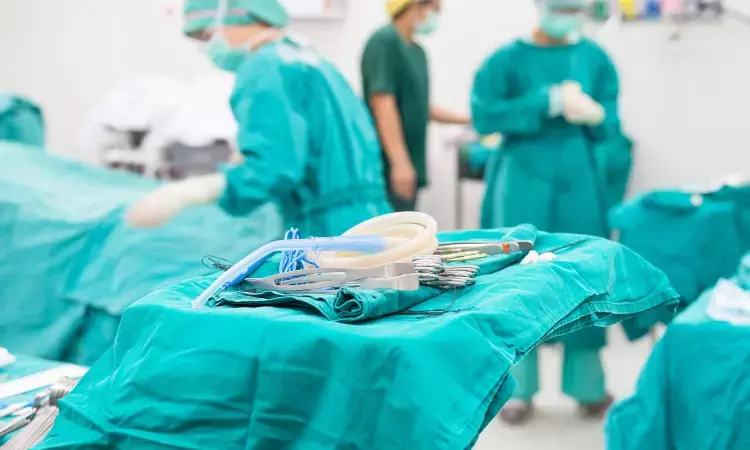- Home
- Medical news & Guidelines
- Anesthesiology
- Cardiology and CTVS
- Critical Care
- Dentistry
- Dermatology
- Diabetes and Endocrinology
- ENT
- Gastroenterology
- Medicine
- Nephrology
- Neurology
- Obstretics-Gynaecology
- Oncology
- Ophthalmology
- Orthopaedics
- Pediatrics-Neonatology
- Psychiatry
- Pulmonology
- Radiology
- Surgery
- Urology
- Laboratory Medicine
- Diet
- Nursing
- Paramedical
- Physiotherapy
- Health news
- Fact Check
- Bone Health Fact Check
- Brain Health Fact Check
- Cancer Related Fact Check
- Child Care Fact Check
- Dental and oral health fact check
- Diabetes and metabolic health fact check
- Diet and Nutrition Fact Check
- Eye and ENT Care Fact Check
- Fitness fact check
- Gut health fact check
- Heart health fact check
- Kidney health fact check
- Medical education fact check
- Men's health fact check
- Respiratory fact check
- Skin and hair care fact check
- Vaccine and Immunization fact check
- Women's health fact check
- AYUSH
- State News
- Andaman and Nicobar Islands
- Andhra Pradesh
- Arunachal Pradesh
- Assam
- Bihar
- Chandigarh
- Chattisgarh
- Dadra and Nagar Haveli
- Daman and Diu
- Delhi
- Goa
- Gujarat
- Haryana
- Himachal Pradesh
- Jammu & Kashmir
- Jharkhand
- Karnataka
- Kerala
- Ladakh
- Lakshadweep
- Madhya Pradesh
- Maharashtra
- Manipur
- Meghalaya
- Mizoram
- Nagaland
- Odisha
- Puducherry
- Punjab
- Rajasthan
- Sikkim
- Tamil Nadu
- Telangana
- Tripura
- Uttar Pradesh
- Uttrakhand
- West Bengal
- Medical Education
- Industry
1 in 5 older adults get infections after heart surgery, and women have a 60% higher risk

One in five older adults gets an infection up to six months after heart surgery-with women far more likely to develop one, according to studies led by Michigan Medicine.
The two studies examined thousands of cases involving Medicare beneficiaries who underwent coronary artery bypass grafting, also known as CABG or heart bypass, or aortic valve replacement.
Women had 60% greater odds of developing postoperative infections, the three most common being urinary tract, pneumonia and sepsis.
Black patients also had higher rates of overall infection (28%) compared to white patients (19.2%).
The studies are published in The Journal of Thoracic and Cardiovascular Surgery.
“Our investigations highlight persistent disparities in outcomes for patients undergoing cardiac surgery that will require multidisciplinary efforts to correct,” said J'undra N. Pegues, M.D., M.S., first author of the study on infection disparities and a T32 research fellow in the Department of Cardiac Surgery at U-M Health.
In one of the studies, which covered hospitals across the state of Michigan, 21.2% of Medicare beneficiaries developed an infection up to six months after surgery.
Pneumonia and UTIs accounted for nearly 17% of all infections, and rates of infection varied nearly 40% across hospitals.
“Tracking infections beyond the short time horizon is important, as some hospitals are better equipped than others to prevent infections, and some patients face disproportionate challenges given social determinants of health,” Pegues said.
Several past studies have uncovered lower rates of infection after these procedures.
The higher numbers found in the two current studies, investigators say, are likely due to the longer follow-up period of six months.
“Patients who have a heart bypass or valve replacement surgery are at risk for developing other infections that may come about over a longer period of time, such as UTIs and gastrointestinal infections,” said Donald Likosky, Ph.D., senior author of both studies and Richard and Norma Sarns Research Professor of Cardiac Surgery at U-M Medical School.
Most national registries neither track these additional infections nor conduct surveillance beyond 30 days after the procedure, says Charles Schwartz, M.D., chair of the Department of Surgery at Trinity Health Oakland and co-author on both of these studies.
“This likely results in a vast underestimation of the burden of infections following cardiac surgery,” Schwartz said.
Heart bypass and aortic valve replacement account for more than half of all cardiac surgical procedures in Michigan. Nationwide, CABG accounts more than 70% of all heart surgeries.
In one of the Michigan studies, patients receiving their operation at lower performing hospitals, with higher expected rates of infection, were more likely to be discharged to extended care or rehabilitation facilities.
“The findings highlight that patients are at risk for developing infections early and late after their cardiac surgical procedure,” said co-author of both studies Francis Pagani, M.D., Ph.D., the Otto Gago M.D. Endowed Professor in Cardiac Surgery at U-M Medical School and associate director of the Michigan Society of Thoracic and Cardiovascular Surgeons Quality Collaborative.
“Other age-related health conditions, such as diabetes, high blood pressure and cancer, may contribute to later-occurring infections identified in this study.”
Likosky’s study team notes that collaborative learning efforts between health care systems are needed to reduce disparities in patient outcomes.
Through a statewide quality improvement intervention spanning 2012 through 2017, hospitals that adopted infection prevention strategies were able to achieve lower the risk of pneumonia relative to the rest of the country.
“Our study reinforces the importance of bringing together hospitals and community stakeholders to identify and subsequently implement potentially modifiable hospital and community practices to prevent postoperative infections” said Syed Sikandar Raza, M.D., first author and integrated thoracic surgery resident at U-M Health.
Reference:
Raza, Syed Sikandar et al. Interhospital variability in 180-day infections following cardiac surgery, Journal of Thoracic and Cardiovascular Surgery, DOI 10.1016/j.jtcvs.2025.01.006
Dr Kamal Kant Kohli-MBBS, DTCD- a chest specialist with more than 30 years of practice and a flair for writing clinical articles, Dr Kamal Kant Kohli joined Medical Dialogues as a Chief Editor of Medical News. Besides writing articles, as an editor, he proofreads and verifies all the medical content published on Medical Dialogues including those coming from journals, studies,medical conferences,guidelines etc. Email: drkohli@medicaldialogues.in. Contact no. 011-43720751


